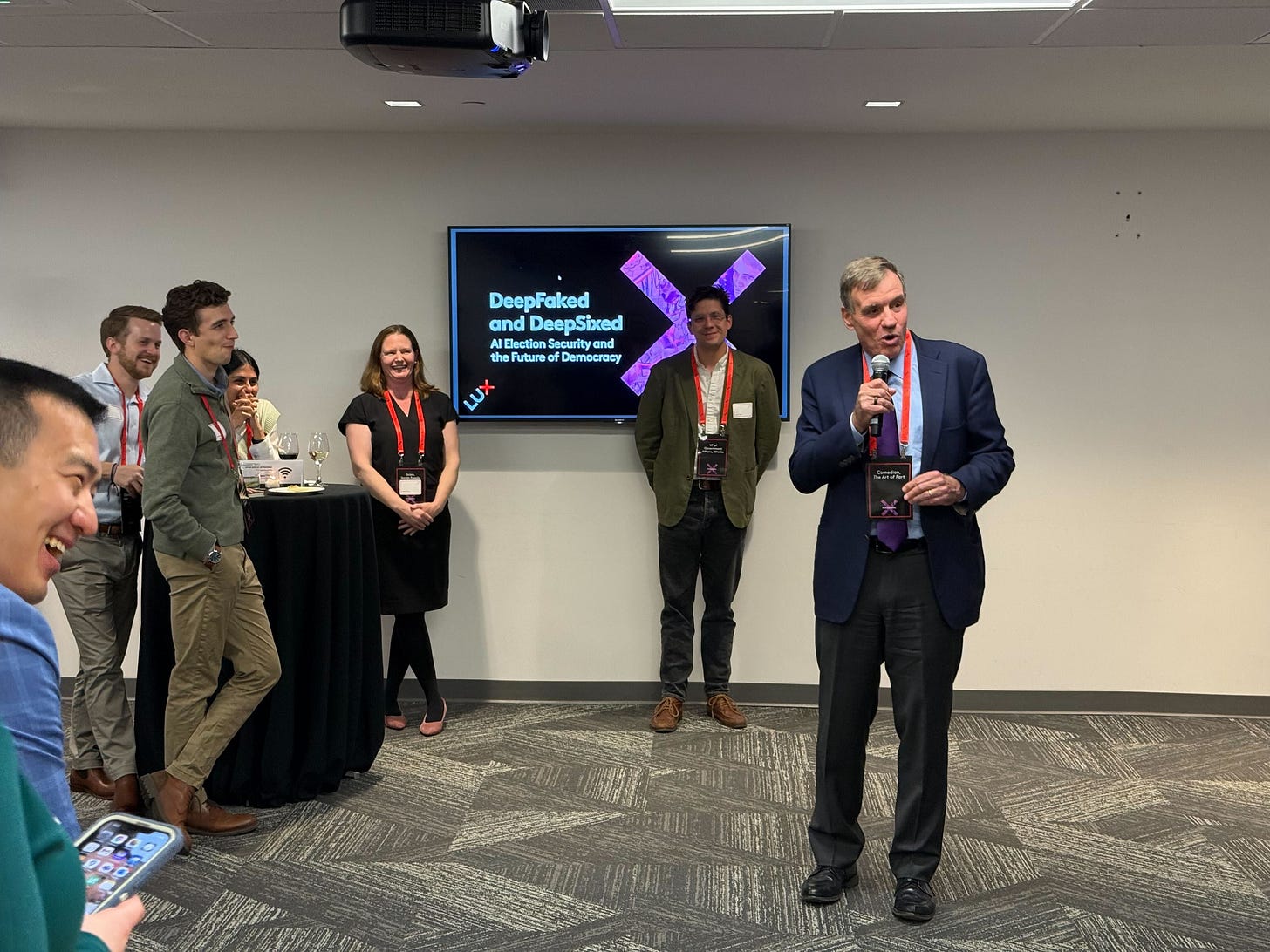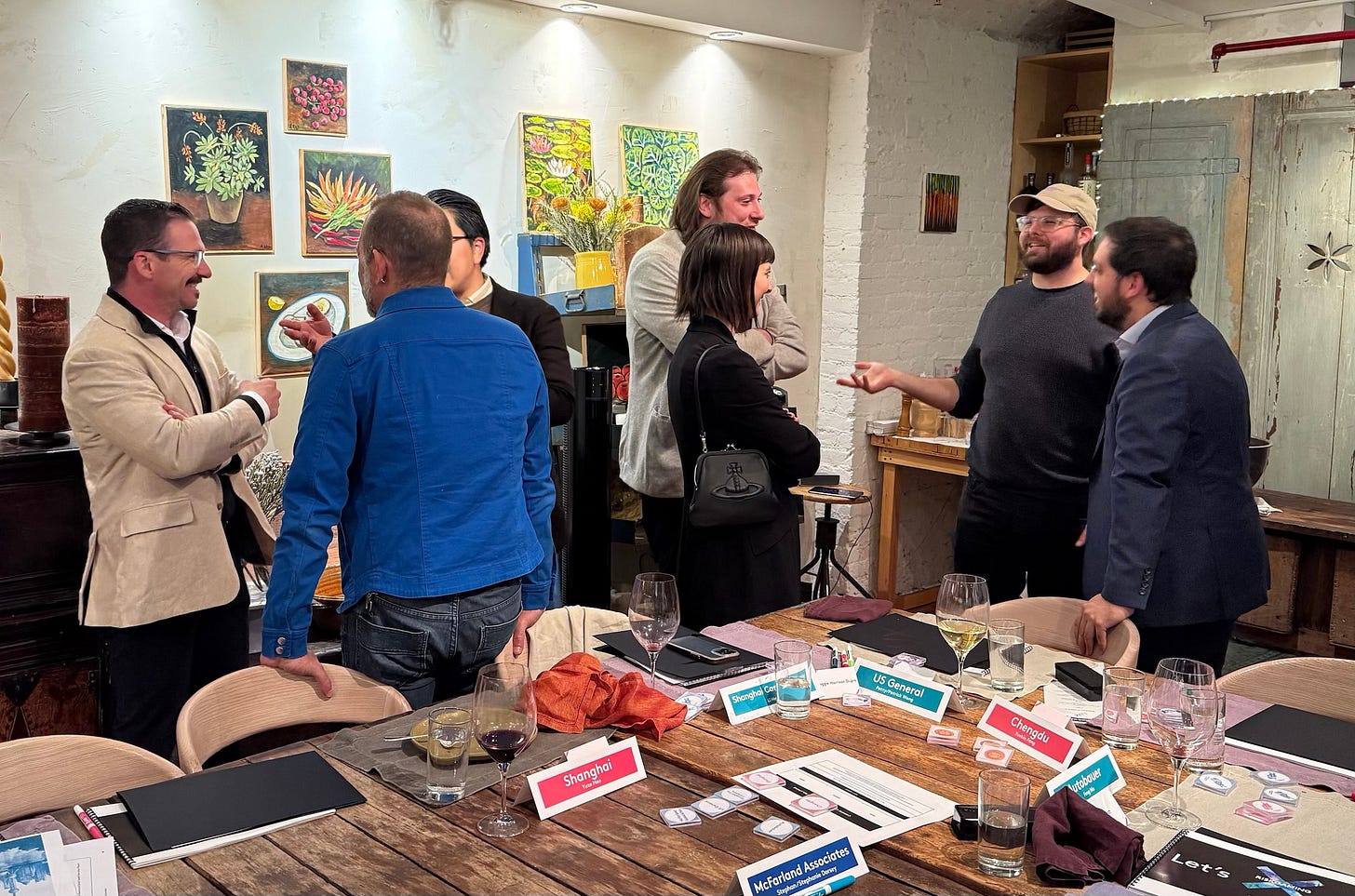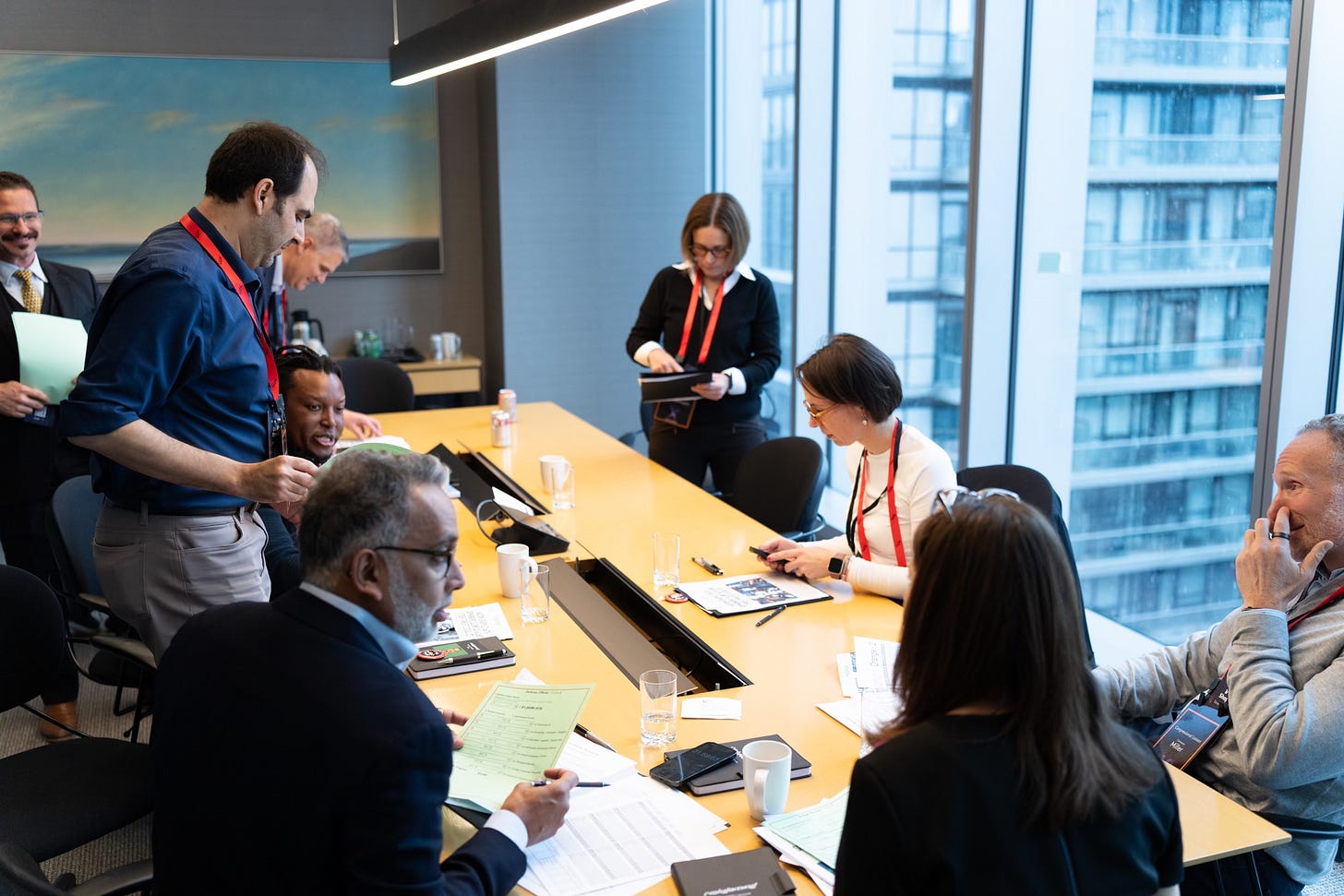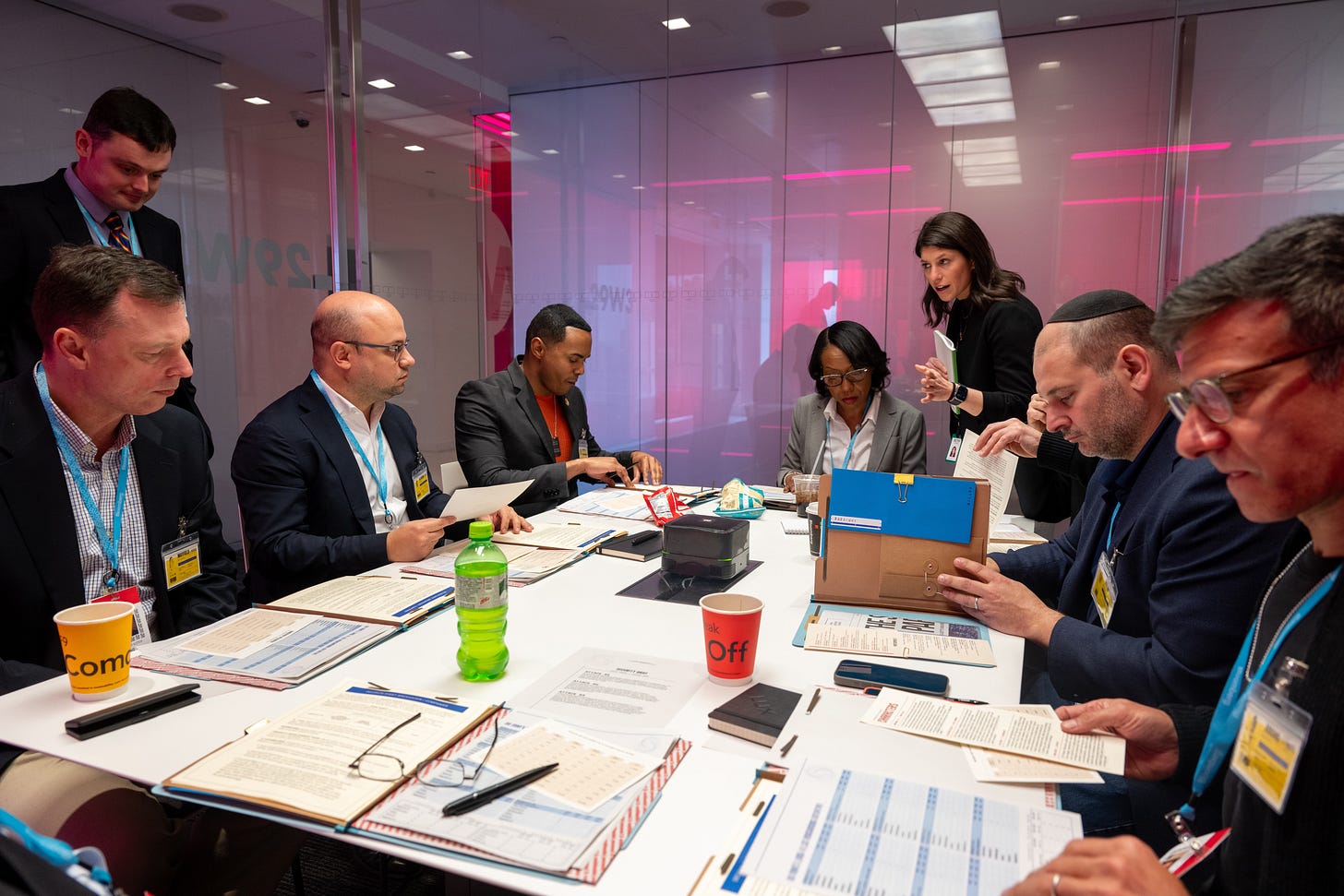Riskgaming against a world on fire: A manifesto, of sorts
Strategic exhilaration is the apotheosis of the Riskgaming experience.
We live in an idiot inferno. A leader offers an anodyne bromide, and the response is a volcano of impassioned invective as users heatedly smash quote-tweets, counter-tweets, angry DMs and blocks. Detailed proposals for progress are recklessly shot down in a fusillade of white-hot lead by the carnal fire of bubbling hatred. Pioneering into the deep cosmos or the molecular interstices of our cells elicits not wonder but feverish objections, scorching science today and burning down our futures entirely. Wildfires in our minds; wildfires outside of them — a self-desecrating people on a desiccated Earth incubating a collective demise.

Thoughtful action has been replaced by mindless reaction in a regressive recursion, with reactionary flamethrowers leading the charge on our most critical problems. Torch more of the institutions, they proffer — we won’t miss them. Fire the experts and certainly fire the professionals. All of them deliberative deadwood, kindling just waiting for that stochastic spark. We didn’t want them, and now, we won’t have them. These senseless reactions beget further reactions, each adding its own exothermic heat to the entropic cauldron of chaos that is our world.
A few fight back against this incineration of reason, but far too many flee to the even drier shores of nihilism. Rather than inciting a conflagration of conscience, they instead marinate in stupor. The hot perspiration of the present chills them into repose without any reaction whatsoever.
Nihilism leads nowhere. What we need is intentional action, crisply considered amidst the char of certitude. Passionate dispassion, just as intense but also observant, strategic and most importantly, swift. A breath taken, a moment’s pause, a beat passed — each additional tick of the clock not a retreat but a reflection: here, not there. This, not that.
What we need is sangfroid against a world on fire; cool concision against the inferno. An intentional combat against the broiling brutality of a world that doesn’t give a steaming shit anymore.
What we need is Riskgaming.
How can we play at a time like this? Airports bombed by clandestine foreign adversaries, an avian flu pandemic, scientists and researchers and even ideas under threat, global markets roiling from inflation and tariffs, key shipping lanes terrorized, public infrastructure failing, natural disasters befalling everyone — not to mention the very fundamentals of free and competitive markets, liberal democracy, enlightened experimentation and cosmopolitan engagement threatened by the ignoble and the ignorant. This is no time for play.
I understand the sentiment. Yet, how can we escape our tribal hatreds, our barriers of thought, our lack of empathy and our unawareness of the patterned complexities of our world? A few more tweets and a smash-cut TikTok video? Another policy memo recommending an “all of the above” solution and a jargon-laden panel that anesthetizes half its audience? A dissertation that sleeps in the bowels of an ivy-covered library? It’s well past time to change formats.
Riskgaming was once a shot in the dark, a flare amidst the fog of ignorance. We feared no one would dare to join a game they knew nothing about, on subjects they weren’t aware of, all cooperating with and competing against one another in an intense but intelligent negotiation over the future of the possible.
But they did.
Senators did. Generals and admirals did. CEOs did. Also joining us at our tables were think tank presidents, leading scientists, board members of Fortune 500 companies, founders, financial and intelligence analysts, engineers, portfolio managers and diplomats. They’ve joined in the Americas, but also in Europe and Asia and Australia.

The spark that ignites each of them isn’t the fiery reaction of the flamethrower, but simply the cool embrace of their independent curiosities. Attuned to change, aware of their limits and ambitious to overcome their destinies, they played. They competed. And some of them even won. Once an idea, Riskgaming is now a global network of leaders who share a most intense experience: strategically competing on a complex terrain beyond the ken of certainty.
What can Riskgaming do for you — and for all of us? Salve the primal passions. Force us to confront the profound ambiguities of our world. Sharpen our strategic decision-making under uncertainty. Most importantly, secure a shared humanity, one where, as Terence once said, “nothing human is alien to me.”
Lux Capital has been my home for a few years now, and for good reason: it’s the rare place that can balance the tenacious chase of the possible with perspicacity. We live within reality and not apart from it, a reality that we have the fortune to shape every day for the benefit of all.
Through our games as well as our newsletter and podcast, Riskgaming explores the emergent complexities of our networked world, the challenge of seeing truth in a society of crooked mirrors, the pursuit of deep strategy in a world of frenzied reactions and the unlocking of the rational intuitions latent in all of us.
What does that really mean? Let me reveal a few of our secrets.
Accept emergence from society’s complex networks
Civilization is the progress of abstract complexity. Everyone can readily understand rudimentary hunter-gatherer societies, but when it comes to our own world, we feel adrift.
Artists and professionals who have labored on their crafts for years are flummoxed by artificial intelligence, which can do months of yesterday’s work in seconds. Jobs are increasingly precarious and fleeting, as are the securities of life from health to housing. The economy itself is nothing more than a fractal labyrinth of black boxes impossible to comprehend. No one seems to truly know anything about anything, and that’s a frightening state.
It’s true that our world is irreducibly complex. Our social networks, knowledge networks, supplier and trade networks, transportation and logistics networks, policy networks and talent networks shape and are shaped by reality and our own actions. That complexity begets further complexity as these networks adapt to each other in an infinite recursion of constraints and affordances. The calculus of logistics is mediated by the costs of labor and technology, themselves determined by available infrastructure, itself constrained by state capacity, material availability and mobilized workers. Where would you like to start?

For many, they start with straightjacketing the world to their preconceived and simplified models. We see this behavior in the increasingly populist command for strangulating order. We get pithy and persuasive messages like “Take Back Control,” the pivotal slogan of the Brexit campaign, or more recently, “America First.” Like empty calories though, we quickly burn through the gleaming energy of their simplicity only to find ourselves starving for strategic action.
Simplifying is enormously attractive, hence its recent successes. We want a path with frequent checkpoints on the journey to nostalgic greatness. Our companies wish to sustain profits without competition, while our nations succeed based on historical momentum — never by our own present hands. We don’t want to constantly uncover the truths of the world and make decisions; frankly, just leave us alone.
I wish it were all so simple, but it isn’t — and thank god, since intricacy and nuance are our greatest forces for genius.
There’s an alternative to abject simplification, and that is accepting the necessary abstractions that determine the fate of our world. Self-organizing patterns will emerge from any profoundly complex system driven by decentralized individuals scaffolded by incentives. We will never understand all of the intricate threads of these patterns, yet, we don’t have to. What’s inscrutable is actually legible if we choose to carefully observe what’s at hand and accept what’s not.
Everything is all so complex and yet … it all (mostly) works. Today, across twenty-four glorious hours of human existence, hundreds of millions of packages will be delivered to their intended recipients. Tens of millions of people will fly on uncomfortable seats in tin cans floating in the atmosphere and land elsewhere without event. Trillions of dollars of securities will change hands in the crush of the market, while tens of thousands of homes will be purchased, thousands of trials will reach their verdicts and millions of lines of code will be written by engineers. We will only understand some of this emergent behavior — the rest we just need to accept.
This emergence is frustrating because we cede the very thing we desire: control. Control means domination, yet our choices are proscribed before we even begin. Staring into that abyss of awesome abstraction, it’s easy to retreat: it’s all too much, too overwhelming. No wonder so many want to burn it all down.
Yet everything we build upon in civilization is predicated on emergent complexity. From the self-regulating mechanisms of the cell and our own daily habits to how companies compete for customers and nations angle for advantage, we are all part of this great weave, an interlocking set of networks that constrain us, sure, but also empower us to direct our freedom as we wish. Even more importantly, that weave isn’t fixed. With the right strategy, practically any constraint can change.
We must escape our impulse for simplifying narrowness. Yesterday’s “Take Back Control” is today’s “Build More Factories.” Commanding, simplifying, direct — and impossible. What would it really take? No one can understand it all for sure, but acting in concert, we would begin by understanding networks. The networks of trade and global supply chains that create manufacturing value. The networks of companies and capital required to organize construction and operations. The networks of workers bringing their skillful knowledge to one opportunity over another. The networks of transportation and logistics required to move inputs and ship outputs. The power grid and waterworks required to run these plants.
What looks like an irreducible impossibility though happens regularly. That’s because factories aren’t built by dictate — they emerge from a networked niche. Entrepreneurs don’t react to complexity and attempt to overthrow the entire world order, destroying what they don’t understand. Instead, they seek fleeting congruences where these networks converge and offer a possibility for success, and ignore the rest.
Those moments are fleeting because our world isn’t fixed, but is dynamic and constantly evolving. The very networks that constrain us are also responsive, loosening and tightening to our demands and innovations. Our collective actions will close some niches that were once viable, but also open new ones that never before existed. Adaptation requires energy, and it can be exhausting to vigilantly and constantly proceed forward. Yet, how could it be otherwise in a world of discovery and technological progress?
Civilization’s bounty is predicated on complexity. We may yearn for the simple legibility of pre-modern cultures, but our loss of authority and control have offered us an emergent prosperity our forebears could only dream of. We are not adrift, but we do need an objective perspective to comprehend what’s happening, and that too is increasingly under fire.
See the world with greater objectivity through experiential gaming
One reaction to the vastness of our world is to try to summarize it, and nearly all media force us in such a direction. There are only so many words in a paragraph, so many frames in a film. Our scientific instruments can’t explore every molecule and galaxy, and so we must reduce the vast infinities of life into pithier forms. The development of statistics is concomitant with the rise of modern states (which is why they share the same linguistic root).
As media have gotten shorter and faster, our representations of reality have further lost fidelity. More is left out, and yet, more than ever needs to be added back in. Nuanced debates that afforded space for complicated but complete thoughts have been replaced with trite slogans. A writing culture grounded in deep and critical analysis has been replaced with the airy pontifications of oral dialogues. Our metrics squeeze vast diversities into alluringly precise and worryingly incorrect figures.
We need a new approach, particularly on complex issues at the intersection of science, technology and policy. Subjects like these typically circulate in national capitals in the form of abbreviated memos, shot through with bullet-points that reduce critical wisdom into cryptic throwaways. They never describe who the players are and their motivations. They never describe the intricate tradeoffs that networks force on everyone. Even worse, they entirely ignore that systems aren’t designed top-down, but rather emerge from many independent interactions. They even ignore the evolution of these systems, and that they recursively adapt to aggregate behavior.

Our Riskgaming scenarios, plus our newsletter and podcast, are designed to overcome these failures. We want everyone to understand the patterns that shape the most complicated issues with an eye toward ground truth. It’s an experience that offers a basis for objectively understanding our complex world and ultimately shape it.
It’s little wonder that the notion of objectivity itself has been under assault. The recursive networks of the material world apply just as much to knowledge and perception, and each of us views only one small part of the whole system. Multiplied by the divergent representations we use, it’s painfully obvious why we seem unable to converge on a shared set of truths.
Yet, the world isn’t an impossible puzzle immune to inspection. Progress is the constant unraveling of our world’s arcana into patterns. Far from losing objectivity today, we are constantly nearing truth in an asymptotic assault on ignorance. We know more about the fundamental laws of physics, the biology of our cells, the spillovers of economics and sociology, and each other as people on this shared planet than ever before, if only we are willing to engage with the depths of our accumulated knowledge.
Of course, depth isn’t often offered by our hyper-partisan and under-funded media. Objectivity is expensive. Uncovering the machinations behind a government contract may take years of laborious archival research and persistent reporting. Discovering the truths of the cosmos may require a multi-billion dollar orbital telescope and years of research from thousands of scientists.
When we see malformed representations of these truths, our cynicism is heightened. The existence of bad representations though is not proof that representations are impossible, but merely that one must seek out better ones. If a model of the market fails, design a better model. If a description of a war doesn’t reflect what’s happening on the ground, fund a better chronicler. If our predictions on orbital mechanics are wrong, develop a better theory.
If our media isn’t telling us the full and complicated truth: find another source, or another medium entirely. Experiential gaming offers a deeper, more empathic perspective, even as strategic decision-making wanes in the hellscape.
Fighting the scandalous demise of strategic action
It’s one thing to understand the world; it’s another to act upon it. If we can somehow dispassionately recognize the patterned complexities binding us, what should we do?
We hate tradeoffs and the deep thinking they require. Yet all of our resources are finite, from the materials in the ground and the compute in the cloud to the memory and focus of our own minds and organizations. We as individuals can never do it all, nor can our institutions. Adding to the challenge, we have to constantly rebalance tradeoffs alongside the world’s dynamism. Over time, new technologies, policies, conflicts, theories, business models, cultures and people will reshuffle what tradeoffs work and which ones don’t.

Responding to tradeoffs is the art of strategy, a difficult, exhausting and yet crucial task. It’s also a skill that’s atrophying. The attenuated thinking afforded by social media coupled with a bubbling atavistic anger has led both everyday citizens and also some of the world’s most powerful leaders to forfeit even a rudimentary strategic perspective. High-minded people like to talk about second- and third-order effects, but increasingly, we witness decisions that don’t even countenance what might be dubbed zero-order effects: what did we just cause exactly?
Like many, my response has at times been one of impetuous nihilism. How can one possibly bring to bear a curiosity for the world’s intricacies and the careful engineering required for any plan to bear fruit when the decisions made by so many are so obviously wrong? Not wrong on their values or intentions, which are always up for debate, of course. Objectively wrong in that the decisions can’t possibly lead to the outcomes their makers want.
Yet over time, I have come to appreciate just how much we’re bereft of moments for strategic thinking. Scandalously, our upbringing offers few opportunities to practice these skills. School is too often reduced to an industrial pipeline of facts stuffed into youthful minds in a march to the frontiers of knowledge. Organizations — bigger and more unwieldy than ever — offer employees little agency to make decisions under uncertainty in areas with limited knowledge. Few of us ever get to experience the thrill and terror of being thrown into a novel situation and forced to bring enlightened order to the darkness.
With the inexorable changes buffeting society, of course nearly everyone fails to seize the potential of the future. No one should be surprised that the first instinct of Hollywood screenwriters and dockworkers alike is a fight against automation rather than a measured response to technological breakthroughs that can create jobs, raise wages and improve productivity to boot. In an interconnected world where distant events seem to shake the very foundations of society, no one should be surprised that more and more countries are lurching toward left and right populist movements, rather than pivoting to growth and prosperity for all. It’s simply a lack of practice, and a surrender to simplification.
It is absolutely possible to rebuild strategic insight for a new world, to take our past experiences and absorb new lessons. But it’s not going to happen in an office around a PowerPoint presentation — it has to be rigorously participatory, and that’s where Riskgaming plays a critical role.
Emancipate your strategic intuition through Riskgaming
I hate poker. That’s not quite right though: I hate the circumscribed arena that games like poker operate within. Yes, it’s reassuring to play a game with a strict set of memorable rules, an artificial environment where a flush beats a straight and the probabilities of the cards are predetermined. It’s therapeutic and a useful reminder that even our most fundamental actions — when to commit and when to quit — take persistent effort to perfect and can be lost over time.
Real life is nothing like a game of poker though. Networks may bind us, but there’s still incredible flexibility to pick diverging paths, to break the rules or tack around them, to pivot around disruptive change and jump ahead while others stay stagnant. The infinite scope of life means that it’s possible to improvise a strategy that has never been done before.
It’s precisely that deeper uncertainty — not the stochastic nature of a hand of cards, but the impossibility of knowing the probabilities ahead of us — that so entrances me. I want to practice confronting that unknown every single day, and help others practice it as well.
Games are the core of Riskgaming, but games designed in a very specific way. They test strategic intuition, force decision-making under uncertainty and transport the minds of their players into far-flung roles, all under an accelerating ticking clock. There is a certain stress and discomfort that comes from taking on new roles with no experience or assistance. Competition in these games doesn’t just add pressure, but also evolutionary probabilities: to what degree do those who want to help or hurt others change the very dynamics of the game itself?

Tabletop exercises have been a mainstay of business schools for decades, and wargaming has been popular among flag officers going back to the Prussians of the nineteenth century. What’s missing from all of these games though is independent contact with the unknown. Red teaming and group discussions offer camaraderie, but rarely offer moments of strategic solitude. With Riskgaming, I drop a player into the unknown, with just enough information to get their basic bearings and a whole toolset of strategic options, and then force them to improvise a plan in the heat of the moment on the way to victory or defeat. Strategic exhilaration is the apotheosis of the Riskgaming experience.
Then there’s the commentary across our newsletters and podcasts that fills in the gaps between scenarios. A gaming experience is a multi-hour intense experience, and unfortunately, few can often take a strategic sabbatical. So we offer the same curious, introspective and investigative perspectives on topical issues just as we do in our games. If we can help every reader and listener take one extra second to consider the profound complexities of our world and refine their strategic acumen, I’ll dub it a royal flush and take the pot.
Confronting our primal fear of the unknown
Each of us individually has it within us to understand the systems that bind all of us — and take action. Not through the control of a top-down dictator, but rather through the emergent freedom afforded to each of us as individuals.
Our society has not cultivated that agency recently. Slaves to algorithms, specks in the eye of the economy, lint in the great threads weaving the world’s systems, we have collectively lost perspective that the world really does change when the right actions are applied to it. That requires us both to see with absolute clarity the truth that’s really there, and develop a strategy for how that truth can be changed.
My hope with Riskgaming is that through our games and also the newsletter, podcast and other materials we publish, I can push everyone to confront our primal fear of a complex, mercurial, dynamic and uncertain world that seems forever out of reach. We live at a time of heated strife, our pent-up frustrations steaming out. We don’t need more impulsive and vituperative reactions, nor the nihilistic defeatism of inaction, but rather the cultivated judgment and deliberate actions that can positively transform the lives of ourselves and everyone, forever. Let’s douse this idiot inferno once and for all. Let’s play.


